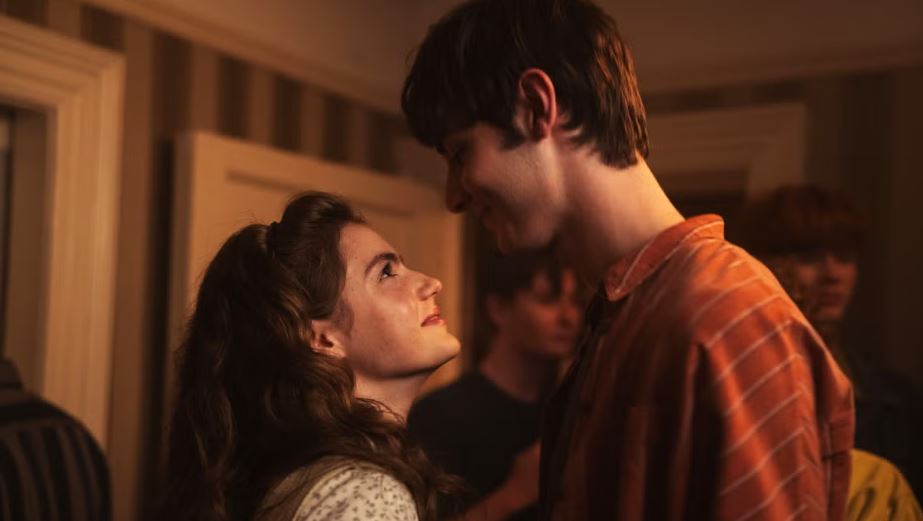| Worth seeing: | for the nostalgia of creating mix-tapes from 1980s classics rather than trying to care about what actually happens to the two leads |

| Featuring: | Florence Hunt, Jim Sturgess, Rory Walton-Smith, Teresa Palmer, Alexis Rodney, Ben Lawson, Brendan McCormack, Chika Ikogwe, Conor Sánchez, Helen Behan, Jacqueline McKenzie, Jonathan Harden, Julia Savage, Mark O'Halloran, Ryan Morgan, Sara Soulié, Siobhán O'Kelly |
| Key crew: | Lucy Gaffy, Angie Fielder, Aoife O'Sullivan, Polly Staniford, Tristan Lynch, Jane Sanderson, Jo Spain |
| Channel: | BBC iPlayer, BBC2 |
| Length: | 56 minutes |
| Episodes: | 4 |
| Broadcast date: | 15th July 2025 |
| Country: | Australia, Finland, Ireland |
WHAT’S IT ABOUT?
Back in 1989, Sheffield teenagers Dan (Rory Walton-Smith) and Alison (Florence Hunt) meet at a party and fall instantly in love. They learn about each other from the mix-tapes they make for each other, as they share their love of music with each other.
His parents are largely receptive to their relationship, but Alison won’t even let Dan know where she lives, let alone introduce him to her family. This secrecy puts a strain on their relationship and it fizzles out completely when Alison just disappears, without telling Dan where – or even why – she is going.
Cut to the modern day and Dan (Jim Sturgess) is still living in Sheffield, working as a music journalist, married to Katja (Sara Soulié), with a son who’s just left home to go to university. Katja believes it’s now time to travel together, but Dan doesn’t want to give up an attractive job opportunity. This puts strain on their relationship.
Alison (Teresa Palmer), meanwhile, is living in Australia, a successful author, whose loving – but controlling – husband Michael (Ben Lawson) is a surgeon, trying to persuade their teenaged daughter that terminating a pregnancy would improve her future prospects. This puts a strain on their relationship.
With all these relationships under strain, Dan and Alison are content – but they’re not happy – and when Dan notices that Alison has just brought out a new novel, he can’t help but find her on facebook and send her a friend request – as you do. Receiving it, she hesitates for a few seconds before accepting.
As they pair begin exchanging Spotify links to songs they remember from the mix tapes of their teenaged years, Alison’s agent suggests that she does a book tour of the UK and visits her home town.
WHAT’S IT LIKE?
This happens about ten minutes into the first of four hour-long episodes. So what do you think is going to happen? Is it worth sticking with the next 3 hours and 50 minutes?
Watching the young love bloom in 1980s Sheffield, as the couple exchange mix-tapes of their favourite songs, is imbued with warmth and nostalgia – frustrated by the difficulties in Alison’s home life. But as in the recent TV adaptation of the Sally Rooney novel, Normal People, this not entirely literal adaptation forces its characters to sabotage their own relationship with stupid decision; yes, they are teenagers, but they still seem to take big decisions without talking to anyone about them – even their friends – and certainly not each other.
But the characters in the present day are considerably more annoying – it is clear from the outset that the creative team wants us to want them to get together, so they have to make their existing partners (and co-parents to their almost grown-up children) seem like selfish, controlling bullies – but a mother who has been waiting for her children to leave home so that she can travel or a father who is worried about his daughter becoming a teenaged mother are not inherently evil people. The outcome is that the main characters – who we are meant to be rooting for – are the ones who seem selfish and entitled.
In the modern-day, exchanging mix-tapes has been updated to Whatsapping Spotify links, which lacks the romance of sitting down and carefully contemplating which songs to curate into a collection. While the concept of a Mix Tape makes an enticing title and premise for the start of a relationship, a series about a couple rekindling their relationship by exchanging Spotify links somehow loses that attraction.
Modern-day Dan retains a sense of honesty, humility and longing – and a guilt that he no longer loves his partner as much as he did – or as much as he should; grown-up Alison, though, comes across as spoilt and petulant and – when the pair finally reacquaint themselves, rather than act as you might imagine – or expect – it turns out that she remains every bit as selfish – and immature – as she was when we first met her in the 1980s.
The story is rife with misunderstandings – both in the flashbacks and in the modern-day – so this might conveniently explain away some apparent inconsistencies but not enough for the audience to feel that the rightful ending to this childhood romance is the break-up of two relationships – on the opposite sides of the world – so that the protagonists can reunite – possibly only briefly, until they fall out over something and she runs off again.
Sometimes the past is in the past for a perfectly good reason, and while it might be nice to look at old photos, listen to old songs – or dig out the old cassette player, the past should remain in the past.
Set in England and Australia – but an Australian, Irish and Finnish co-production – you have to wonder why no British company wanted to get involved in bringing Jane Sanderson’s British-set, British novel to the small screen, as it ends up as tangled as a strip of C90 tape when the heads haven’t been cleaned.
